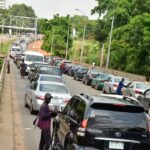The Nigerian National Petroleum Company Ltd (NNPCL) has a plan of investing N1.621 trillion in rehabilitating key federal highways to ease the distribution of petrol and other petroleum products.
However, experts in the oil and gas industry, as well as the built sector, have reacted to how sustainable the scheme could be as they task companies to invest in roads as part of their Corporate Social Responsibility (CSR).
In this piece, Daily Trust on Sunday analyses the progress of work on some of the roads inspected by the Group Chief Executive Officer (GCEO) of NNPC, Malam Mele Kolo Kyari, in Niger and Lagos states recently.
NNPC, last year, began a rollout of the 21 critical federal roads of over 1,804.6 kilometres it is funding through a N621.24bn tax credit scheme in the first phase.
Stranded Benue IDPs get temporary shelter
Victims of Lagos market demolition cry out
Kyari recently inspected the reconstruction of the 124.81km Bida-Lambata section of the Suleja-Mokwa highway in Niger State.
Kyari, who was in company of the Chairman, Federal Inland Revenue Service (FIRS), Muhammad Nami, pledged a N1trn more investment in road infrastructure.
He said, “This is one of the many roads we are doing and we are very satisfied with what we have seen so far. We’re not stopping at this. We’re also going to head on to phase two, which will also enable further over a trillion naira of investment by NNPC in road infrastructure.”
Kyari and his team, that same day, inspected works on the Lagos-Badagry expressway around the Agbara junction and the Nigeria/Benin border.
The NNPC boss lauded President Muhammadu Buhari for issuing Executive Order 007 which allows firms to convert their taxes to fund public projects through the Road Infrastructure Development and Refurbishment Investment Tax Credit Scheme (RITC) for 10 years.
He said, “We believe that this intervention will bring change to our country, will bring infrastructure close to our people and also enable the utilisation of tax revenues appropriately.”
Last year, the Nigeria Union of Petroleum and Natural Gas Workers (NUPENG), particularly the Petroleum Tanker Drivers (PTD) section, protested the state of roads, stalling fuel distribution. NNPC then liaised with FIRS and the Federal Ministry of Works and Housing to convert N621bn tax to fund reconstruction of 21 roads.
While Nigeria boasts of the largest road network in Africa, only about 60,000km out of its estimated 195,000km road network is paved. Some of the roads are either in a state of disrepair, poorly maintained or altogether untarred.
Dangote, MTN, NNPC embrace order 7
The Executive Order 7 was designed to empower private companies to finance construction or refurbishment of federal roads designated as “Eligible Roads” under the scheme and recoup their investments through deduction of the approved total costs expended on the project from their annual Companies Income Tax (CIT).
Before the NNPC took advantage of the Order 7, the Dangote Group had test run it with the popular 43km Obajana-Kabba road where the Obajana Cement Plant (OCP) is sited while advocating the adoption of concrete roads. The group had commissioned the 26km Itori-Ibese concrete road as a CSR earlier.
In October, the Federal Executive Council (FEC) approved the takeover of the construction work on the Enugu-Onitsha expressway by MTN Nigeria at N202bn.
Other roads fixed include Apapa-Oshodi, Oworonshoki-Ojota expressway in Lagos; the Bodo-Bonny expressway in Port Harcourt was done by the Nigeria Liquefied Natural Gas (NLNG) Ltd and FIRS issued a N37.28bn tax credit certificate
Few months after NNPC released N621bn to revamp selected Nigerian roads, the company is planning to invest over N1trn for a similar purpose.
In the first phase of this project, the North Central got the highest chunk of N244.87bn of the N621bn, while the South South emerged the second highest beneficiary with N172.02bn.
The South West got N81.87bn, the North East had N56.12bn, the South East had N43.28bn allocation, while the North West had N23.05bn.
NNPC’s assets base and operations span across different regions of the country and the oil and gas industry. NNPC has 21 depots and over 800 filling stations under NNPC Retail, especially with the recent acquisition of all the over 300 Oando (OVH) retail stations, as well as other midstream and downstream assets.
Kyari expressed satisfaction with the progress of work so far done in the project sites visited, adding that the NNPC had done its part in releasing all the funds needed for their execution.
He said, “We believe that in the next 24 months, there will be massive change to the entire road network in this country and this is why NNPC is your company and working for all of us.”
He stated that the quality of work was top-notch, revealing that the consultants deployed during Buhari’s stint at the Petroleum Trust Fund (PTF) were handling the jobs.”
The Director, Roads, Ministry of Works, Folorunso Esan, said that through the intervention NNPC had been able to improve the pace of the project from 10 per cent to about 40 per cent within a very short period.
Speaking, Chairman of FIRS, Muhammad Nami, said the roads would ease distribution of petroleum products.
He said, “We want to appreciate the NNPC for choosing this; we want to appreciate MTN and other taxpayers that are fixing other roads also. We want to encourage other taxpayers to key into this scheme.”
Companies should consider road fixing as CSR – Experts
There are calls for more firms like BUA and Flour Mill Nigeria to embrace this scheme in a different way, especially for companies whose heavy duty trucks ply the federal highways.
John Oyewale, a highway civil engineer in Abuja. Said, “NNPC cannot finish this thing that it started, rightfully, the federal government should have a way of compelling Dangote, BUA, oil marketers among others to devote a part of their funding as CSR to fix the road.
“These monies can come into a common pool as CSR donations annually, taken to finance priority roads.”
For Engr Aliyu Garba, a top official of one of the road construction firms in Kaduna, the scheme embraced by NNPC is laudable.
He, however, said the implication of taking the company’s tax to fund roads meant less revenue into government coffers for other priority projects.
He called for the tolling of major roads once their rehabilitation was completed so that the government could leverage from the scheme and revive the old way of revenue generation from roads.
Garba said, “If you recall, in the past there were toll gates everywhere and up till now, the airports are maintained with toll revenues. Why are the roads different? The government must revive toll gates, because whether NNPC or Dangote, if they use the tax money to fix roads, FIRS is losing a part of its revenue target but tolling the roads can augment the revenue base.”
Peters Edafe, an oil and gas support service expert and head of Rockoil Ltd, said marketers whose tankers plied the routes should be compelled to contribute to an endowment fund for road fixing domiciled at the Nigerian Midstream and Downstream Petroleum Regulatory Authority (NMDPRA).
He said, “Government cannot continue the scheme like this because it will deprive revenue for other projects like health and education. The endowment fund is the best and NNPC, oil marketers among others, can contribute to this. Then the other option as done overseas should be toll gates.

 Join Daily Trust WhatsApp Community For Quick Access To News and Happenings Around You.
Join Daily Trust WhatsApp Community For Quick Access To News and Happenings Around You.



